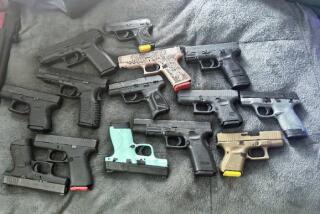Group Sees Lax Oversight of ‘High-Crime’ Firearm Dealers
WASHINGTON — About a fifth of the gun dealers that were the most frequent suppliers of firearms linked to crimes during the late 1990s are no longer in business, although enforcement efforts against dealers are lagging under the Bush administration, a gun-control group said in a study released Monday.
Using federal data, Americans for Gun Safety found that the vast majority of “high-crime dealers” continues to operate, with little federal oversight. The group found that most of the dealers had not been federally inspected since 2000, and that the total number of criminal prosecutions of dealers by the Justice Department had declined 25% in 2002, compared with the last year of Clinton’s presidency.
The study identified 120 dealers -- out of 80,000 federally licensed to sell guns nationally -- that were the source of firearms used in 200 or more crimes between 1996 and 2000. Together, those dealers supplied weapons used in nearly 15% of the gun crimes in the period.
“If a few fast-food chains were responsible for 15% of food poisoning cases in the nation, there is little doubt that government would take steps to alert citizens about which restaurants were responsible,” said Jim Kessler, the group’s policy director. “Known high-crime dealers are being shielded from public scrutiny, rather than investigated by the government.”
The group -- which opposes legislation pending in Congress to put new limits on the public disclosure of gun-tracing data -- called for Congress and Atty. Gen. John Ashcroft to create a “High-Crime Dealer Watch List” and step up investigations and prosecution of “corrupt stores.”
The group found that 24 of the 120 high-volume dealers were no longer operating, either forced out by regulators or merged with new owners, in some cases operating on the Internet. Three of six California-based firms identified in the study were among those that had gone out of business.
Chuck’s Guns in Riverdale, Ill., topped the list, with 2,370 crime-related guns sold, according to the study. A person answering the phone at the shop declined to comment. About half the stores named were in five states -- Indiana, Illinois, Virginia, Georgia and Maryland.
The group noted that a store that had sold a gun used in a crime did not necessarily violate the law. But the authors argued that stores that habitually sell guns used in crime should be more closely monitored.
The report was based on Bureau of Alcohol, Tobacco, Firearms and Explosives data that surfaced in a lawsuit by the National Assn. for the Advancement of Colored People in federal court in Brooklyn, N.Y. The suit, which was later dismissed, sought to hold major gun manufacturers liable for some of the costs of urban crime.
The 120 firms accounted for 54,694 of the 373,006 “suspicious” guns during the five-year period. A gun is considered suspicious if it has an obliterated serial number or is recovered in a crime within three years of first being sold, among other factors.
Monica Goodling, a Justice Department spokeswoman, defended the administration’s record on gun-law enforcement, and said that based on 2003 data, and including state prosecutions, the number of dealer prosecutions was rising.
She added that ATF field offices were increasingly focusing on dealers that had been identified as having sold guns later recovered by law enforcement.
More to Read
Sign up for Essential California
The most important California stories and recommendations in your inbox every morning.
You may occasionally receive promotional content from the Los Angeles Times.










